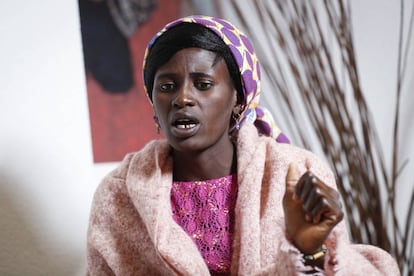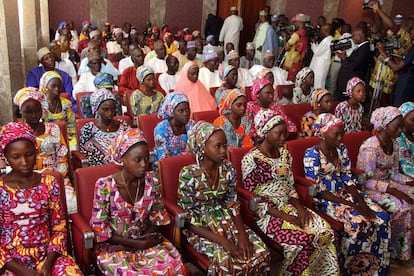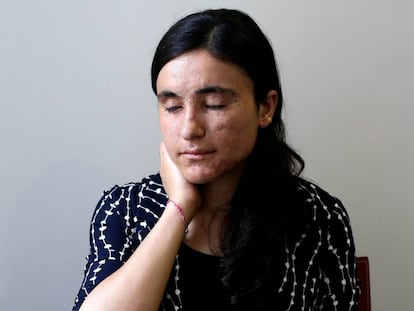Boko Haram victim: ¡°Every day I remember I had a child with one of them¡±
In Madrid, Rebeca Bitrus recounts the harrowing ordeal she suffered at the hands of terrorist group


During her captivity, Rebeca Bitrus met some of the girls from Chibok. One of them suggested that she convert to Islam, as her captors were telling her to do, or she would see what they were capable of. But she didn¡¯t. Two years in the hands of the Nigerian terrorist group Boko Haram, subjected to sexual assault and beatings, to abuse and forced labor; two years without the youngest of her children, who was murdered by the fundamentalist sect, and still, Rebeca, a Christian, would not bow to their will and change religion.
She¡¯s 29 years old now, and she speaks about that part of her ordeal, the resistance, with great pride in the Hausa language. Tears spring from her eyes when she thinks about where she was at that time and where she finds herself now. She covers herself up with her shawl to stop the emotion from flowing out, and continues with her tale. What does she remember of that experience? ¡°I remember every day,¡± she explains, ¡°that I had a child with Boko Haram.¡± His name is Crist¨®bal and he has been baptized.
She is not from Chibok, the village where on the night of April 15, 2014, Boko Haram ¨C whose name can be translated from Hausa as ¡°Western education is forbidden¡± ¨C arrived to kidnap more than 200 young girls. The assault sparked a massive international campaign. Rebeca is from another village, one that is not so well known, called Dogon Chuku. But dozens of women were also taken from there on August 21 of the same year. She was among them.
Two years subject to sexual assault and beatings, to abuse and forced labor; two years without the youngest of her children
She was living at the time with her husband, Bitrus Zacarias, and her two children. They were small-scale farmers and traders. When they got news that the terrorist group ¨C which currently has links with the so-called Islamic State ¨C had set foot in Baga, which is very close to their village, they opted to do what many other families had done: he would go one way, and she, with the children, another. Under Boko Haram, men are murdered without hesitation, while women are kidnapped. ¡°They find it very hard to kill them,¡± explains Father Innocent Zambua, who is accompanying Rebeca and acting as her translator.
¨C Were you scared then?
¨C I had heard talk about Boko Haram, but I had never come face to face with them. When I saw them killing people, I fell to the ground and felt something horrible. I didn¡¯t understand it.

But she was going to understand the cost of that terror a lot better on her way to the camp where she was to be held ¨C located somewhere between the borders of Nigeria, Chad and Cameroon, and where today the fundamentalist sect still spreads terror, despite an offensive by President Muhammadu Buhari which many consider insufficient. Halfway through the journey, the youngest of Rebeca¡¯s children, aged barely a year, started to cry. She wept too, so as not to have to continue with the journey. A man in uniform from Boko Haram grabbed the child and threw him into the river to shut him up. The baby drowned.
¡°When I saw them drown my child I knew that they were going to kill us,¡± the young woman explains, before gazing off into the distance.
When I saw them killing people, I fell to the ground. I didn¡¯t understand it
Horrendous violence has been a calling card over the last eight years for the Islamist sect, which was born in 2002 in the northeast of Nigeria. Its objective? The establishment of a caliphate in one of the poorest areas of Nigeria. The result? A long campaign of assaults, kidnappings and attacks in the states of Borno, Adamawa and Yobe that have cost the lives of between 20,000 and 30,000 people, and forced more than two million people to flee their homes.
Rebeca was going to endure two years of captivity, moving from one camp to another, from one soldier to another, from one kind of abuse to the next. She fought off the sexual assaults until one day, a young Boko Haram leader sought help from three accomplices and abused her. That was how she became pregnant with Crist¨®bal, the child who was born in captivity. But the abuse didn¡¯t stop there.
She was briefly tempted to leave her newborn in the claws of the terrorists
¡°They also tried to convince me to carry a bomb for an attack,¡± she explains. She thought that this was her opportunity: as others had done, she might be able to flee with her children once she had removed the explosives belt. But they wouldn¡¯t let her take the kids with her, so there was no deal.
By 2016, the military campaign put into action by Buhari, with support from neighboring countries, was well underway. Rebeca¡¯s captors could hear the army helicopters approaching. They brought together the girls and began to flee ¨C but Rebeca did not flee with them. Taking advantage of the confusion, she managed to escape with her two children, little Crist¨®bal and Zacar¨ªas. She was briefly tempted to leave the newborn in the claws of the terrorists, but a Nigerian soldier said to her: ¡°Keep him, and you will be able to show him very important things in life.¡±
It¡¯s because of all of this ¨C her determination to keep the faith that she chose, to hold on to a child that was born as the result of rape ¨C that the Spanish branch of Aid to the Church in Need (Ayuda a la Iglesia Necesitada), which specializes in denouncing religious persecution, took her as an example and brought her to Madrid this week.
¡°I¡¯m here, I¡¯ve put on weight again, and I can tell my story,¡± she explains. ¡°So yes, I¡¯m happy.¡± When her flight to Dogon Chuku lands, she will be met by her husband, who, like herself, managed to flee from death ¨C another defiant act in the face of terror.
English version by Simon Hunter.
Tu suscripci¨®n se est¨¢ usando en otro dispositivo
?Quieres a?adir otro usuario a tu suscripci¨®n?
Si contin¨²as leyendo en este dispositivo, no se podr¨¢ leer en el otro.
FlechaTu suscripci¨®n se est¨¢ usando en otro dispositivo y solo puedes acceder a EL PA?S desde un dispositivo a la vez.
Si quieres compartir tu cuenta, cambia tu suscripci¨®n a la modalidad Premium, as¨ª podr¨¢s a?adir otro usuario. Cada uno acceder¨¢ con su propia cuenta de email, lo que os permitir¨¢ personalizar vuestra experiencia en EL PA?S.
?Tienes una suscripci¨®n de empresa? Accede aqu¨ª para contratar m¨¢s cuentas.
En el caso de no saber qui¨¦n est¨¢ usando tu cuenta, te recomendamos cambiar tu contrase?a aqu¨ª.
Si decides continuar compartiendo tu cuenta, este mensaje se mostrar¨¢ en tu dispositivo y en el de la otra persona que est¨¢ usando tu cuenta de forma indefinida, afectando a tu experiencia de lectura. Puedes consultar aqu¨ª los t¨¦rminos y condiciones de la suscripci¨®n digital.










































